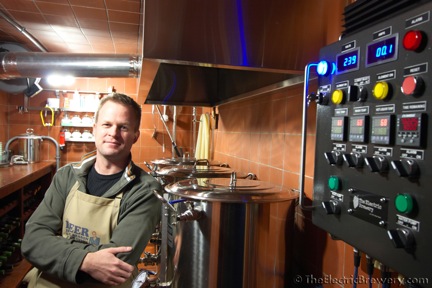Articles
Electric Brewing Q&A
Kal Wallner, the creator of The Electric Brewery and frequent BYO contributor, and Trent Neutgens, the creator of the all-electric all-grain brewing setup featured in the January-February issue of BYO, took over the BYO Facebook page for a couple hours on January 21 for a live chat about electric brewing. Here are the highlights.
Hybrid Beer Styles
Do you like brown ales? How about India pale ales (IPAs)? Then why not a brown IPA? Learn how to envision, formulate and brew a “fusion beer” — a beer that is made by combining the elements of two or more existing beer styles. Plus: two example recipes.
Understanding Yeast Metabolism
Yeast are microscopic, unicellular fungi that are capable of converting various types of sugar into ethanol and other byproducts. Yeast take in sugars and anaerobically (without oxygen) metabolize them to produce energy,
Make Your Own Cider
Cider. The word has mythological overtones, especially in rural areas where it is or was made. But just what is it? What differentiates it from mere “apple juice”? After all, technically, unfermented
Hard Cider: Tips from the Pros
Put the snapple in your apple with tips from the makers of Woodchuck Cider, Ace Cider and Ashton Lewis of Springfield Brewing Company.
Making Cider: Tips from the Pros
Three cider makers discuss apples and the craft of cidermaking.
The Extract Equation
With a calculator and a little knowledge, you can convert any all-grain recipe to an all-extract version. Here’s how.
Controlling Fermentation Temperature
Controlling the temperature of your fermentations is one of the best ways to improve the quality of your beers; we’ll show you how — from low-tech tricks to high-tech equipment.
Brewing with Honey: Tips from Pros
Mead may get all the press when it comes to fermenting beverages with honey, but there are many craft beers with a taste of honey out there. In this issue, two honey-friendly
Fruit Beers
Some folks think fruit beer is for beginners, but that’s not the case. Just like getting a tan on vacation — you need to start with a good base.
Practical Guide to Filtration
One of the first differences beginning brewers may notice between their creations and commercial beer is clarity — or a lack thereof. I can remember when I’d sometimes run across a slightly











